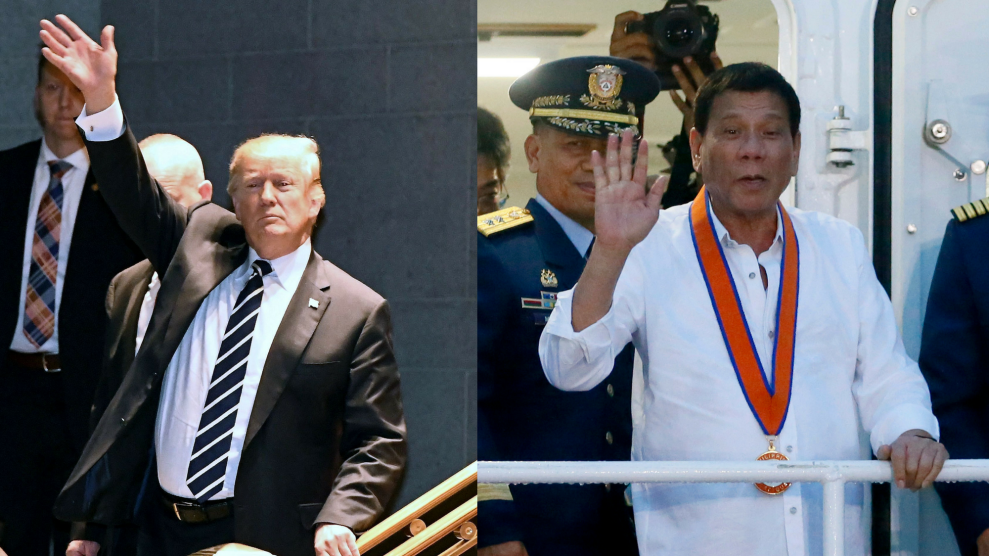
REX/Shutterstock; Bullit Marquez/AP
The Trump administration released on Monday an itinerary for his upcoming trip to Asia next month, planned to strengthen alliances and curb the threat of Kim Jong Un’s nuclear program. Perhaps unsurprisingly the trip will include a meeting with the president of the Philippines, Rodrigo Duterte.
Trump’s affinity for the strongman who has called both the Pope and former President Barack Obama “son[s] of a whore” is far from new. The president invited Duterte to visit the White House back in December, and a leaked transcript of a call between the two leaders this spring reveals that Trump congratulated Duterte for doing “an unbelievable job on the drug problem,” which has been called a “human rights calamity” by Human Rights Watch. Now they’ll finally meet face to face when the president makes the trip to Manila on November 12.
In the lead up to the trip, it’s worth remembering that Duterte boasts a long and disgraceful résumé of unacceptable “locker-room talk,” not to mention casual promises of mass murder. Here are just some of the lowlights:
Thousands have died in a violent drug war under Duterte
More than 7,000 people reportedly have been killed by police and vigilantes in Duterte’s drug war. One of his pivotal campaign promises last year was to tackle the country’s rampant drug trade by killing 100,000 drug traffickers and users with, what he called in April, a “bloody” death: “I will use the military and the police to go out and arrest them, hunt for them. And if they will offer a violent resistance, and thereby placing the lives of the law enforcers and the military whom I would task for a job to do, I will simply say, ‘Kill them all and end the problem.’” Security forces and “unidentified gunmen” kill frequently and with impunity, and the government refuses to take any responsibility. Duterte, though, recently announced he will be suspending drug war operations to appease the harsh headlines from across the world: “This is better for the bleeding hearts and the media,” he said in a speech. “I hope I will satisfy you.”
He’s expressed a personal penchant for killing
In 2015, he admitted to killing three men who kidnapped and raped a Chinese girl. He acknowledged he shot the men and threatened, “I can slash open your body and eat your heart in front of you.” Then in December of last year, he said he was prone to seeking out trouble during his tenure as mayor of Davao City. (He was elected in 1988 and served as both mayor and vice mayor up until he won the presidential ticket.) “I’d go around in Davao with a motorcycle, with a big bike around, and I would just patrol the streets, looking for trouble also. I was really looking for a confrontation so I could kill,” he said according to a BBC report.
He’s threatened a “revolutionary government“
As European leaders and other politicians fear the dictatorial direction of his regime, Duterte has flexed his right to establish a “revolutionary government,” which does not require congressional approval. In fact, he has been threatening to eliminate congress and enact laws through extraconstitutional means as early as his 2016 presidential campaign, according to Filipino news site Rappler. During a televised speech in Davao City in October, he told his opposition to beware: “I will declare a revolutionary government, you are all arrested. I am not scaring people, just remember that.”
Duterte has favorably compared himself to Hitler
Duterte compared his crackdown on drug addicts to the Holocaust in a September 2016 speech. “Hitler massacred three million Jews, now, there is three million drug addicts. I’d be happy to slaughter them,” he said. In addition to the fact that both of those figures are incorrect (six million Jews died during the Holocaust and there were reportedly 1.8 million drug addicts in the Philippines at that time) human rights organizations publicly decried his inhumane remarks. His press team published a somewhat apologetic statement afterward, which made national headlines: “The president’s reference to the slaughter was an oblique deflection of the way he has been pictured as a mass murderer, a Hitler, a label he rejects.”
He has made heinous comments about rape
A video surfaced in April 2016 of Duterte speaking at a campaign rally in which the then-presidential candidate made horrific comments about a 1989 rape that happened during a prison riot in Davao City: “I saw her face and I thought, ‘What a pity… they raped her, they all lined up. I was mad she was raped but she was so beautiful. I thought, the mayor should have been first.'” It took him nearly a decade to apologize.













